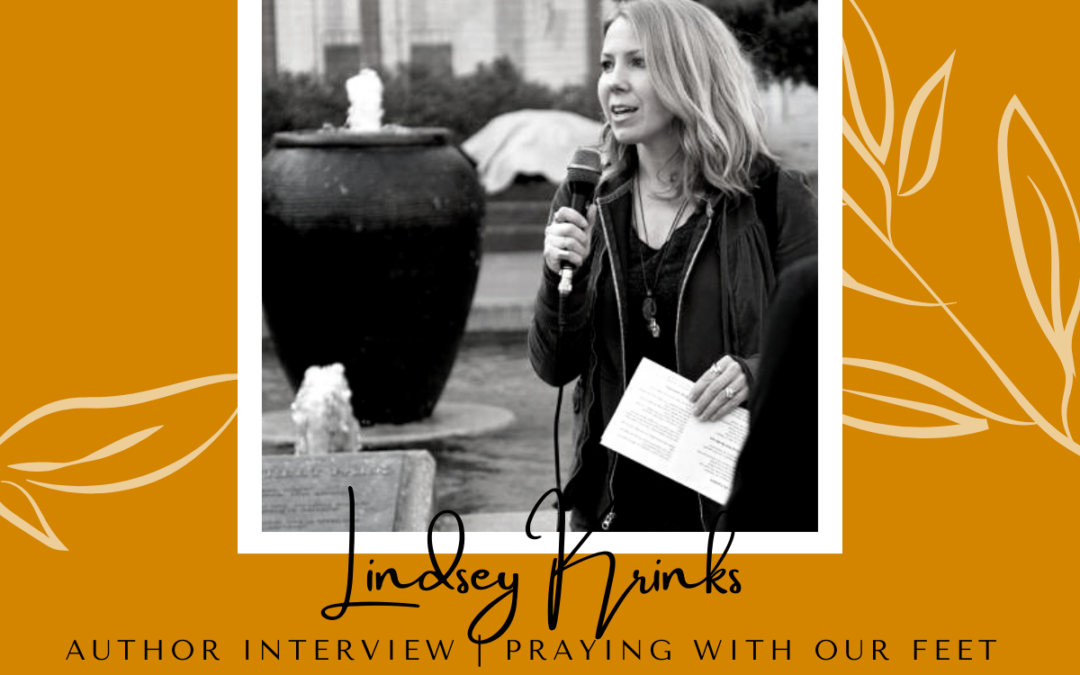Sometimes there’s a book that comes along and hits all your buttons as a reader, that was the case for me when I picked up Lindsey Krinks’s Praying with Our Feet: Pursuing Justice and Healing on the Streets. In the vein of Fr. Gregory Boyle’s Barking to the Choir, Krinks is a master storyteller that takes the small moments of her ministry with unhoused members of the Nashville community and artfully weaves them together with thoughtful theological reflection, personal narrative and insight that is neither saccharine or oversimplified. The stories she tells are beautifully crafted as well as providing insight into the struggle of the unhoused that provide insight to both veterans to justice work and those who are curious about the issues and want to learn more. I was delighted when Lindsey was willing to be interviewed about Praying with Our Feet because it is one of the few books this year that I read in under and day but has stayed with me for months.
Cara: We have never met, but our time and relationships in Nashville overlapped, which made this a particularly moving book for me. The specific places and people of Nashville felt like a homecoming. But I also find that the more specific a story is, the more universal the message can be. What are some of the larger practices that create dignity for the unhoused that other communities can learn from?
Lindsey: A couple years ago, my friend Susan told a group of social work students about how dehumanizing her experience of homelessness was. “Just because I live under a bridge doesn’t mean I don’t have feelings,” she said. “I deserve to be treated with the same respect that you give to a man in a three piece suit.” If we truly knew how much trauma, disenfranchisement, violence, and loss people on the streets have experienced, we would stand in utter awe of their resilience and ability to survive. It’s also a beautiful thing to see friends like Susan reclaim their dignity and worth in the shadows of a system that is stacked against them at every turn.
I often tell college students and church groups that the way we treat people on a micro and macro level matters. When you see the person standing on the median asking for spare change, the simple act of looking them in the eye, waving, and greeting them with warmth affirms their human dignity and can literally change their body chemistry. If people want to go a step further, it’s so helpful to carry things like socks, snacks, and water in your car to hand out to people. Some folks even make care packages to hand out by putting survival items in a gallon ziploc bag. It’s also fine to give a few bucks if that is something you’re comfortable with… it’s like a modern-day version of giving alms. That kindness matters, and kindness on a systemic level is justice.
The macro level work can seem more difficult, but anyone can take steps and be part of creating the kin-dom of God in the here and now. Maybe it looks like educating yourself and your community and raising awareness about homelessness, affordable housing, racial justice, and other issues. Maybe it looks like talking to your council member or attending a public meeting or demonstration. Maybe it looks like supporting or volunteering with an organization that is doing the work. We all have a role to play, and the prophets are imploring us to act.
Cara: In some ways Praying with Our Feet feels like a love letter to the parts of Nashville many people don’t see. What is it you want people to see that often goes unseen in urban areas?
LIndsey: Absolutely. Getting to see and know Nashville “from below” has transformed me and how I see everything, including Scripture, including God. We forget that the land is a living thing. We forget that there was a time before we divided up our cities and towns into slices of property that could be owned and exploited for gain. We forget the blood that has been spilled, the people who have been silenced and displaced, and even the struggles that have been won beneath our very feet. Asking questions and learning about the history of places that matter to us is a dangerous and transformative practice.
When we’re in urban spaces, my hope is that we can train our eyes to look beneath the shimmer and shine. Look beneath the underpasses, in the alleys, in the patch of woods, down the train tracks. Look for those who have been pushed out. Ask them about their stories. The way we treat the most marginalized members of our society is the way we treat God.
Cara: Krista Tippett once said “if we tell a truth about love, it’s a hard truth.” I feel like Praying with Our Feet tells a hard truth about love and what it means to love our neighbors. What was the hardest truth you told in Praying with Our Feet about what it takes to love your neighbor and even yourself?
Lindsey: Oh, this is such a good question. If I’m honest, the absolute hardest truth for me on a personal level has been learning and believing that my wholeness matters, too. If your readers are familiar with the Enneagram, I’m a “3,” or what they call “The Achiever,” and I have a strong “2” or “Helper” wing. That means that I have a strong tendency to prioritize tasks and the needs of other people at the expense of my own health and even some of my relationships. I’ve done a lot of work on myself over the years, but if I’m not careful, the tendency to work myself to the bone and to try to earn my worth in the eyes of others can creep back in.
The amazing thing that happened for me was this: While I was busy fighting for a world where everyone could be more whole, my community, my husband, and my friends on the streets reminded me again and again that I was enough. That I didn’t have to earn or prove anything. That my wholeness and well-being mattered, too. I do have to give a shout-out to the retreat center at the Abbey of Gethsemane and my therapist (lol), but truly, community is everything. It was through loving my neighbor that I learned to love myself.
Cara: You talk about the burn out in justice and non-profit work candidly in Praying with Our Feet, what is breathing life into your work right now? What is sustaining you?
Lindsey: This year has been so difficult, not only because of COVID, but also because my husband Andrew and I lost our home in a tornado and had a baby on top of everything. Our baby is just turning one and while he is amazing, I’ve really struggled, as a mother, to keep up with some of the contemplative practices that have sustained me in the past. To be real, I think I’ve been on autopilot lately with my spirituality. But even still, I can feel this deep sense of love sustaining and guiding me quietly like a rudder. It’s love for the people we serve and accompany. Love for the earth and nature. Love for God and for our sweet little family. Love for all the change-makers who are continuing to move forward against all odds.
Cara: I love your honesty about the way motherhood has changed your practices. They are constantly reshaping my own and I don’t think we talk about that shifting ground nearly enough.
I appreciate the way Praying with Our Feet critiques the role of the church in caring for the unhouse in a community, referring to the “religious and nonprofit industrial complex.” There are several stories that show readers the fleeting and toxic ways these groups operate in urban communities. Many of my readers are church leaders, so what do you think the role of the church is in this work? Or another way to put it is: how should the church show up if they want to depart from their toxic history and become co-conspirators and collaborators in housing justice in their community?
Lindsey: One of my favorite quotes (and I have a lot of favorites!) is one about the role of the church in times of injustice. This quote is by a Catholic missionary and priest named Donal Dorr and it has stayed with me since I started doing this work: “The church cannot be content to play the part of a nurse looking after the casualties of the system. It must play an active part both in challenging the present unjust structures and in pioneering alternatives.”
So often, we forget that if the church is going to embody good news to the poor, then we have to get our hands dirty in the struggle for a better world. Challenge unjust structures, says Dorr. Pioneer alternatives. What unjust structures, systems, and rules need to be dismantled? What creative solutions can we co-create and implement with our communities?
At some point, we have to find ways to move from just doing charity and service work to being in solidarity with marginalized people and communities. Solidarity always begins with closer proximity and relationships. It involves listening and “moving at the speed of trust,” as author adrienne maree brown puts it. It grows from there, one step at a time, and maybe a leap of faith here and there. There is also an element of critical self reflection that we need to do about the roles we’ve had – individually and collectively – in propping up unjust structures over time. If we’re not willing to do our work, we’re probably not ready to be in relationships of solidarity. Personal transformation and systemic transformation go hand in hand.
The beautiful and encouraging thing is that the work of justice is never meant to be carried alone. It is both a burden and a gift that we shoulder together. It invites us into deeper relationships and creative partnerships with other faith communities, non-profits, and movement organizations. And as the old story by Flannery O’Connor goes, “the life you save may be your own.”
Cara: What are you praying for right now?
Lindsey: Every night, I pick my one year old son Larkin up in my arms before bedtime and carry him outside to say our prayers. The Talmud reads, “Never pray in a room without windows,” and so we take that a step further! I want him to know a faith that faces outward, not just inward. We pray for our friends on the streets, our friends in prison, and all those who aren’t free. We pray for our cats and family and friends, “Mama Earth,” and so much more. But every night, we close our prayer by saying, “We pray for the coming of a new and better world.” I look forward to the day he realizes that we pray that prayer with our lips and hearts, but we are also called to pray it with our feet.
Cara: Never pray in a room without windows–that’s beautiful. If readers want to connect with you and your work in Nashville, where can they find you?
Lindsey: You can follow the work of the Open Table Project in Nashville on Facebook and Instagram as we disrupt cycles of poverty, journey with the marginalized and provide education about issues of homelessness.
Like what you’ve read? Want more? Sign up for This Gathered Word, a twice a month newsletter (because we’re not spammy) and get original content you can’t find here on the blog. Reflections on faith and living, book recommendations and other good, nerdy fun. Sign up HERE.



Recent Comments